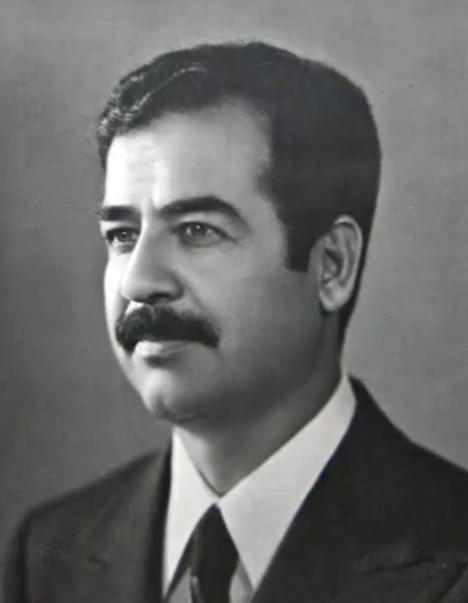A closer look at the most debated and controversial moments involving Saddam Hussein.
Saddam Hussein was the fifth president of Iraq from 1979 to 2003, following the American invasion. He was a key member of the Arab Socialist Ba'ath Party and advocated for Ba'athism, blending Arab nationalism and socialism. His political ideology is known as Saddamism. He previously served as Vice President (1968-1979) and Prime Minister (1979-1991, 1994-2003). His rule ended with his overthrow and subsequent capture.
October 1959: Assassination Attempt on Qasim
In October 1959, Saddam Hussein participated in the Ba'ath Party's assassination attempt on Qasim, though the attempt failed.
1974: Taha Yassin Ramadan Commanded the Popular Army
Beginning in 1974, Taha Yassin Ramadan, a close associate of Saddam, commanded the Popular Army, which had responsibility for internal security. The People's Army acted as a counterweight against any coup attempts by the regular armed forces.
1975: Defeat of Kurdish Rebels
In 1975, after US covertly financed Kurdish rebels during the Second Iraqi-Kurdish War, the Kurds were defeated leading to the forcible relocation of hundreds of thousands of Kurdish civilians.
1978: Crackdown on Iraqi Communists
In 1978, a crackdown on Iraqi Communists strained Iraqi relations with the Soviet Union, leading Iraq to take on a more Western orientation.
July 1979: Purge of Ba'ath Party Leaders
On July 22, 1979, Saddam Hussein convened an assembly of Ba'ath Party leaders and initiated a purge, claiming to have found a fifth column within the ruling party. 68 alleged co-conspirators were arrested. 22 were sentenced to execution, with other high-ranking members of the party forming the firing squad.
1979: Countercoup Purges
In 1979, the "countercoup" purges happened. In June 1982, half of the sixteen RCC members who had survived the 1979 "countercoup" were removed from power.
1979: Period of Tension Between Iraq and Iran
Throughout 1979, a long period of tension between the two countries happened which resulted in war during September 1980, including frequent border skirmishes, calls by Khomeini for the Shia Muslims in Iraq to revolt against the ruling Ba'ath Party, and allegations of Iraqi support for ethnic separatists in Iran.
April 1980: Attempted Assassination of Tariq Aziz
On April 1, 1980, the Islamic Dawa Party, attempted to assassinate Tariq Aziz, Iraq's then deputy prime minister at the University of Baghdad campus, in retaliation for a 30 March decree declaring "membership of Dawa [to be] a capital offense".
September 1980: Outbreak of the Iran-Iraq War
The war in September 1980 was preceded by a long period of tension between Iraq and Iran throughout 1979 and 1980, including frequent border skirmishes. On 10 September 1980, Iraq forcibly reclaimed territories in Zain al-Qaws and Saif Saad that it had been promised under the terms of the 1975 Algiers Agreement but that Iran had never handed over.
1980: Invasion of Iran
In 1980, Saddam Hussein ordered the invasion of Iran, initiating a prolonged and devastating war.
1981: Israeli Attack on Iraq's Osirak Nuclear Reactor
In 1981, Israel carried out Operation Opera, a surprise attack on Iraq's unfinished Osirak nuclear reactor, with Iranian intelligence support, during the Iran-Iraq war where Israel was one of the main suppliers of military and intelligence support to Iran.
June 1982: Second Round of Purges
In June 1982, a second round of purges took place in the government, when half of the sixteen RCC members who had survived the 1979 "countercoup" were removed from power. Large numbers of Shias were removed from the regime. Later the government invited back Shi'as to held posts within the government, to gain support.
1982: Crimes Against Residents of Dujail
A few weeks later, he was charged by the Iraqi Special Tribunal with crimes committed against residents of Dujail in 1982, following a failed assassination attempt against him. Specific charges included the murder of 148 people, torture of women and children and the illegal arrest of 399 others.
1982: Mukhabarat Operations at Home and Abroad
Foreign observers believed that from 1982, the Department of General Intelligence commanded by Barzan Ibrahim al-Tikriti, operated both at home and abroad in its mission to seek out and eliminate Saddam's perceived opponents.
1982: Killing of 148 Shia residents in Dujail
In 1982, 148 Shia residents in the town of Dujail were killed which led to Saddam Hussein being found guilty of crimes against humanity in November 2006.
March 1988: Halabja Chemical Attack
On 16 March 1988, the Kurdish town of Halabja was attacked with chemical weapons, including mustard gas and nerve agents. The attack killed between 3,200 and 5,000 people, and injured 7,000 to 10,000 more, primarily civilians, during the Anfal campaign.
1988: Culmination of the Anfal Campaign
In 1988, the Anfal campaign, led by Ali Hassan al-Majid, reached its height. This campaign, conducted between 1986 and 1989, targeted the Kurdish population and other ethnic groups in Northern Iraq, resulting in the deaths of an estimated 50,000 to 182,000 people.
August 1990: Invasion of Kuwait
On 2 August 1990, Saddam Hussein invaded Kuwait, initially claiming to assist Kuwaiti revolutionaries, triggering an international crisis. By 28 August, Kuwait was formally declared the 19th Governorate of Iraq.
1990: Invasion of Kuwait
In 1990, Saddam Hussein invaded Kuwait, leading to international condemnation and the subsequent Gulf War.
March 1991: End of Gulf War and Cease-fire Agreement
In March 1991, the Gulf War concluded with a cease-fire agreement where Iraq agreed to dismantle its poison gas and germ weapons under UN supervision. UN trade sanctions remained until full compliance. Despite the defeat, Saddam Hussein publicly claimed victory. Bush announced a "new world order", emphasizing peace, security, freedom, and the rule of law.
1991: Gulf War
Until the Gulf War in 1991, Iraq had a more Western orientation following a crackdown on Iraqi Communists in 1978 and a shift of trade toward the West, strained Iraqi relations with the Soviet Union.
June 1993: U.S. Missile Attack on Iraq's Intelligence Headquarters
On 26 June 1993, the U.S. launched a missile attack on Iraq's intelligence headquarters in Baghdad, citing violations of the "no-fly zones" and incursions into Kuwait.
1993: Greater emphasis on Islam
From 1993 through the Faith Campaign, Saddam's regime placed a greater emphasis on Islam in all sectors of Iraqi life.
1993: Initiation of the Faith Campaign
In 1993, Saddam Hussein initiated the Faith Campaign under the supervision of vice president Izzat Ibrahim al-Douri to gain support from religious communities. Some elements of Sharia law were introduced, and the phrase "Allahu Akbar" was added to the national flag in Saddam's handwriting.
1995: CIA Attempt to Assassinate Saddam Hussein
In 1995, the CIA made an attempt to assassinate Saddam Hussein, amid a decade-long effort to encourage a military coup in Iraq.
1995: Saddam's referendum results
In the 1995 referendum, Saddam Hussein reportedly received 99.96% of the votes with a 99.47% turnout.
February 1996: Kamel brothers killed after return to Iraq
In February 1996, the Kamel brothers were killed in a gunfight with clan members, just three days after returning to Iraq following assurances of a pardon from Saddam Hussein.
1997: Crises over UN Access to Suspected Weapons Sites
Between 1997 and 1998, crises emerged due to Iraqi resistance to UN access to suspected weapons sites, leading to increased tensions with Western powers.
December 1998: U.S. and British Missile Strikes on Iraq
From 16–19 December 1998, the U.S. and Britain launched intensive missile strikes on Iraq, following Western charges of Iraqi resistance to U.N. access to suspected weapons sites.
1999: Suppression of Uprisings
In 1999, Saddam Hussein's forces suppressed further uprisings in Iraq, maintaining his grip on power.
May 2000: Alleged Secret Meetings with Israeli Government
In May 2000, Saddam Hussein and his representatives allegedly held secret meetings with the Israeli government, proposing to end Iraq's anti-Israel foreign policy if the issue of Palestinian refugees in Lebanon was resolved; however, this was later denied by the Iraqi government.
February 2001: Increased U.S. and British Air Strikes Near Baghdad
In February 2001, after two years of intermittent activity, U.S. and British warplanes intensified their strikes on sites near Baghdad.
2001: Call for Jihad Against Zionist Movement
In 2001, Saddam Hussein declared on Iraqi state television his support for jihad.
January 2002: Bush's "Axis of Evil" Address and Threat to Topple Iraqi Government
In January 2002, President George W. Bush delivered his state of the union address to Congress, in which he spoke of an "axis of evil" consisting of Iran, North Korea, and Iraq. Bush announced that he would possibly take action to topple the Iraqi government because of the threat of its weapons of mass destruction.
November 2002: Return of UN Weapons Inspectors to Iraq
In November 2002, following the passing of UN Security Council Resolution 1441, Saddam Hussein allowed U.N. weapons inspectors led by Hans Blix to return to Iraq. Blix found no stockpiles of WMD during the renewed inspections.
2002: Saddam's referendum results
In the 2002 referendum, Saddam Hussein officially achieved 100% of approval votes and 100% turnout, with all 11,445,638 eligible voters reportedly casting a "Yes" vote.
February 2003: Saddam's Interview with CBS News
On 24 February 2003, Saddam Hussein gave an interview with CBS News reporter Dan Rather, denying the possession of weapons of mass destruction. He expressed a desire for a televised debate with George W. Bush, which was declined.
March 2003: Invasion of Iraq by U.S.-Led Coalition Forces
In March 2003, the United States-led coalition forces initiated the invasion of Iraq. Within three weeks, the Iraqi government and military collapsed, and by early April, coalition forces occupied much of Iraq.
2003: US-Led Invasion and Capture
In 2003, a US-led coalition invaded Iraq, leading to the toppling of Saddam Hussein's regime and his subsequent capture.
November 2006: Saddam found guilty and sentenced to death
In November 2006, Saddam Hussein was found guilty of crimes against humanity for the killing of 148 Shia residents in Dujail in 1982 and sentenced to death by hanging. His half-brother, Barzan Ibrahim, and Awad Hamed al-Bandar, were also convicted and sentenced to death.
December 2006: Execution of Saddam Hussein
On 30 December 2006, Saddam Hussein was executed after being convicted of crimes against humanity by the Iraqi High Tribunal.
December 2006: Saddam Hussein executed by hanging
On December 30, 2006, Saddam Hussein was executed by hanging at Camp Justice in Baghdad. This occurred despite his request to be executed by firing squad due to his role as commander-in-chief.
July 2016: Donald Trump praises Saddam Hussein
In July 2016, then US presidential candidate Donald Trump praised Saddam Hussein for militant suppression and stability during his presidency in Iraq.
Mentioned in this timeline

Donald John Trump is an American politician media personality and...

George W Bush the rd U S President - is...
The United States of America is a federal republic located...
CBS Broadcasting Inc CBS is a prominent American commercial broadcast...
The Union of Soviet Socialist Republics USSR existed from to...
CNN Cable News Network is an American multinational news media...
Trending

2 minutes ago Yoon Suk Yeol, South Korean ex-president, receives life sentence for insurrection and martial law.

2 hours ago Maya Hawke and Christian Lee Hutson celebrated wedding with Stranger Things cast present.
2 hours ago Wizz Air Launches New Larnaka-Barcelona Flights, Boosting Tourism for Cyprus and Spain.

2 hours ago Jon Ossoff criticizes Trump, speech goes viral, fueling 2028 'Front Runner' speculation.
4 hours ago ANTM's controversies are revealed in a new Netflix documentary, with Tyra Banks facing criticism.
4 hours ago EU monitors Albania's legal changes: Concerns raised over Rama's SPAK amendment.
Popular

Jesse Jackson is an American civil rights activist politician and...
Randall Adam Fine is an American politician a Republican who...

Pam Bondi is an American attorney lobbyist and politician currently...

Barack Obama the th U S President - was the...

Martin Luther King Jr was a pivotal leader in the...

Ken Paxton is an American politician and lawyer serving as...
